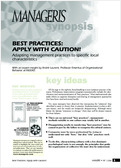Le Tiers-Monde qui réussit

An analysis of four detailed case studies that show how successful companies in developing countries use original management practices adapted to local cultural characteristics.
Author(s): Philippe d'Iribarne
Publisher: Editions Odile Jacob
Date of publication: 2003
Manageris opinion
Founded on the analysis of four detailed case studies, this book shows how successful companies in developing countries use original management practices adapted to local cultural characteristics. The message goes further than this, however, by underlining the importance of integrating the cultural context when defining management practices.
– Don’t miss the short introduction of a dozen pages that clearly put the ensuing case studies into perspective.
– Each of the first four chapters, or over half of the book, is devoted to one of the four case studies, namely, Dannon in Mexico, Sgs-Thomson in Morocco, the Cameroon electric company, and the subsidiary of a French corporation in Argentina. All of these examples are presented in a clear and lively manner that highlights the general teachings to be derived therefrom. You must read at least one of these to appreciate the scope of the book. If you must choose, we recommend the one about Cameroon, which makes a striking contrast between the prior failures and the subsequent success. The most enlightening after that appear to be the cases of Morocco and Mexico. The Argentina case more specifically deals with the promotion of ethical behavior in the organization.
– Based on the four preceding cases, chapter 5 points out how each culture creates a specific context that demands original management methods. Different ways to motivate people and exercise authority effectively are described, for example. Thinking on how to develop effective organizations in developing countries is also provided. Unless you are particularly concerned by this issue, and if you are pressed for time, you may skip this chapter in favor of the more detailed case studies or the following chapter.
– You must read chapter 6 to benefit fully from the main teachings of the book. While touching upon the issue of developing countries, this chapter goes further in proposing critical thinking on the notion of “best practices.” Before tackling this chapter, however, we recommend that you first read at least one detailed case study, or at least chapter 5.
